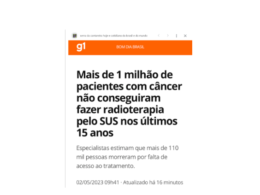the health strategist
multidisciplinary institute
Joaquim Cardoso MSc.
Chief Research and Strategy Officer (CRSO),
Chief Editor and Senior Advisor
August 25, 2023
What is the message?
According to a Wall Street Journal article, written by Samantha Pearson, Brazil is pinning its hopes on Calixcoca, a vaccine designed to hinder the effects of cocaine by inducing antibody production that blocks the drug from reaching the brain.
Despite unproven efficacy in human trials and a lack of successful addiction vaccines worldwide, Brazilian officials view this as a critical step towards combatting the country’s profound crack cocaine epidemic.
This innovative approach holds promise for mitigating the widespread public health and societal challenges posed by drug addiction.

Part of an area in São Paulo that has become known as ‘Crackland.’ PHOTO: ANDREPENNER/ASSOCIATED PRESS
One page summary:
This article by Samantha Pearson, published on August 17, 2023, discusses Brazil’s efforts to address its significant crack cocaine addiction problem by investing in the development of a vaccine known as Calixcoca.
Brazil, being the world’s second-largest consumer of cocaine, faces a massive challenge in tackling drug addiction, with over 3 million regular users of crack and cocaine. The country’s politicians, mayors, state governors, and congressmen, recognizing the urgency of the public-health crisis, are backing research at the Federal University in Minas Gerais to create Latin America’s first vaccine for cocaine addiction.
Calixcoca operates by triggering the production of antibodies that attach to cocaine molecules in the bloodstream, forming larger molecules that are unable to pass through the brain’s protective membrane.
This mechanism aims to neutralize the effects of cocaine, rendering it ineffective and reducing the incentive for addicts to continue using the drug. This innovative approach has shown promise in pregnant rat studies, suggesting potential benefits in protecting unborn babies from the adverse effects of cocaine.
Despite its potential, Calixcoca faces significant challenges. No commercially viable vaccine for drug addiction currently exists, and similar attempts to develop such vaccines have fallen short, including efforts in the United States.
The vaccine’s effectiveness has yet to be proven in human trials. Nevertheless, Brazilian politicians view this research as a beacon of hope in combating a problem that places enormous strain on public-health services and law enforcement agencies.
Brazil is a major global consumer of cocaine, accounting for about a fifth of the world’s demand, trailing only behind the United States.
The Federal University of São Paulo estimates that approximately one in 25 Brazilian adults have used cocaine. The drug addiction has led to severe societal consequences, with addicts wreaking havoc in cities like São Paulo and creating drug-ridden neighborhoods like “Crackland.”
Calixcoca’s lead researcher, Dr. Frederico Garcia, and his team completed successful trials on rats and are now raising funds for human trials, which could commence later in the year. If initial human trial results are positive, fast-track registration could be pursued, with the vaccine potentially becoming available as early as the first half of 2026.
While challenges remain, including the necessity of FDA-like regulatory approval by Brazil’s Anvisa, the vaccine’s relative simplicity of storage and administration could make it viable for widespread implementation, particularly in remote areas and developing countries.
The desperate situation of Brazil’s cocaine addicts has led to significant interest in the vaccine’s potential. Over a thousand individuals in Minas Gerais have registered for clinical trials, some even offering cash for the opportunity to participate.
This underscores the urgency of finding solutions to combat addiction and the potential impact Calixcoca could have on Brazil’s public health crisis. As the article concludes, while the vaccine might not be a definitive solution, the hope it brings to individuals struggling with addiction is significant.
DEEP DIVE

This summary was written based on the article “Brazil Pins Hopes on Vaccine to Fight Crack Epidemic, published by The Wall Street Journal, on August 17, 2023 and written by Samantha Pearson.
To read the full article, access: https://www.wsj.com/world/americas/brazil-pins-hopes-on-vaccine-to-fight-crack-epidemic-e6f93b7f












